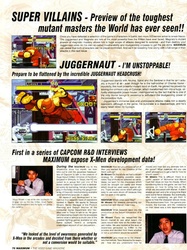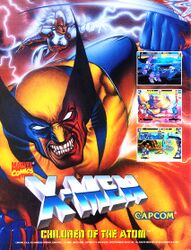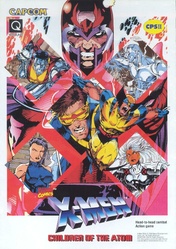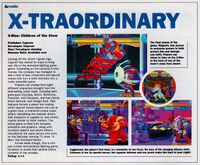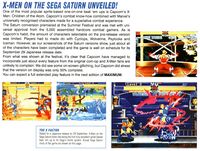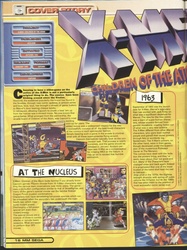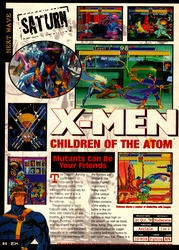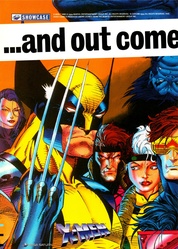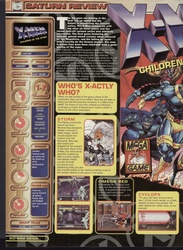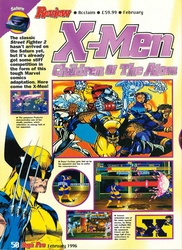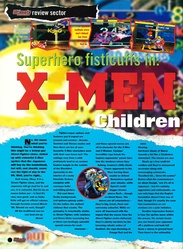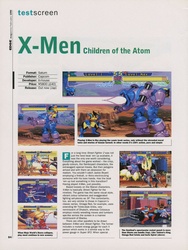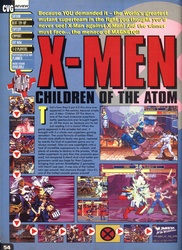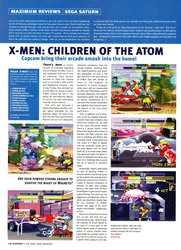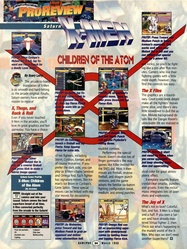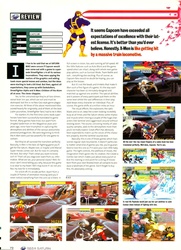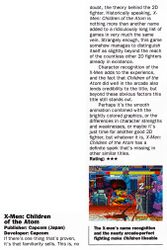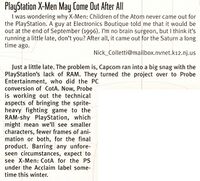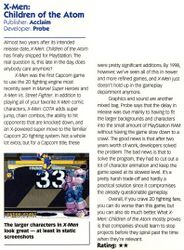X-Men: Children of the Atom
X-Men: Children of the Atom is a fighting game created by Capcom based on Marvel's X-Men comics. Originally released in arcades in 1994 (Asia) and 1995 (Europe and America), it was ported to the Sega Saturn, PC, and PlayStation between 1995 and 1998.
History[edit]
Children of the Atom was developed simultaneously alongside Marvel Super Heroes,[1][Akitomo 1] though the latter game would not hit arcades until after the former's initial release. The games' inception is subject to conflicting recollections: Akira Nishitani, Takeshi Tezuka, and Akiman all remember Katsuya Akitomo's enthusiasm about X-Men and its popularity in America motivating Yoshiki Okamoto (then the head of Capcom's arcade division) to pursue licensing Marvel characters for a game. However, Akitomo himself only recalls Okatomo summoning him to his office and asking for his opinion about the possibility.[Akitomo 2] Akitomo served as both an artist and advisor, suggesting characters to include and making sure that the other developers did not stray too far from the original comics. However, after finding that this was not sufficient to guide such a large development team, he switched from working on the game's artwork to translating relevant Marvel comics to Japanese for their benefit.[Akitomo 3] For Children of the Atom, Akitomo translated the Fatal Attractions storyline[Akitomo 1] that the game's premise was based on. In addition, he wrote or at least supervised the text for each character's ending.[Akitomo 4]
Akitomo noted that Marvel was relatively restrictive about how Children of the Atom could portray their cast, an attitude which would shift following the game's release.[Akitomo 5] For instance, the characters' alternate palettes could not veer too far from their canon coloration.[Akitomo 6] The development team took several liberties in translating Sentinel to the small screen, diverging from the original, more humanoid design.[Akitomo 7] Marvel's copyright division was so incensed by these changes that director Akira Nishitani had to fly to their headquarters to apologize.[Akitomo 8] On the other hand, according to Tatsuya Minami, Marvel stipulated that Capcom include a Street Fighter character in the roster. Not wanting to use protagonists Ryu or Ken, the developers included Akuma as a secret character.[2]
When Children of the Atom was originally released in Japanese arcades in 1994, it garnered good reception from players but fared incredibly poorly from a financial standpoint. According to Katsuya Akitomo, operators were hesitant to invest in games based on American comics, having been burned by previous titles that proved unprofitable.[Akitomo 9] North American sales were better but still failed to meet Capcom's expectations, allegedly due to both business disputes with the region's wholesaler and the popularity of games with digitized actors or 3D graphics (which left operators hesitant to buy a game that still used pixel art).[Akitomo 10]
Interviews[edit]
Histories[edit]
Arcade[edit]
Advertising[edit]
Reviews[edit]
Sega Saturn conversion[edit]
Previews[edit]
Features[edit]
Interviews[edit]
Advertising[edit]
Reviews[edit]
- Game Informer (May 1996; archived via Wayback Machine)
- Game Revolution (posted online on June 6, 2004)
PlayStation conversion[edit]
History[edit]
Reviews[edit]
PC conversion[edit]
Reviews[edit]
References[edit]
- ↑ "X-Men: Children of the Atom: An oral history" by Matt Leone of Polygon
- ↑ MAXIMUM issue 3, 1996 (page 71)
Katsuya Akitomo's tweets (October 30, 2020)[edit]
- ↑ 1.0 1.1 "my first in-house translation was parts 1-3 of Jim Lee's X-Men Vol.2, aka the 'Fatal Attractions' arc where Magneto challenges humankind ... btw, X-Men & MSH were made simultaneously" (excerpted from @gosokkyu's translation of the original tweet)
- ↑ "with regards to the impetus behind X-Men COTA & Marvel Super Heroes, my recollection differs from that of my colleagues: I recall being summoned by arcade division head Yoshiki Okamoto & asked, 'I can probably get the X-Men/Marvel license, whaddya think?' ...but according to director Nishitani, MSH's Tezuka & artist Akiman: 'Akitomo's evangelizing about X-Men's coolness & its popularity in NA inspired the arcade division to want to make an X-Men game, which motivated Okamoto to pursue the license'" "in short: I guess my mission to convert ppl to X-Men was more effective than I'd thought, & so Okamoto did the math & decided to get the rights?" (translated by @gosokkyu from the original tweets)
- ↑ "when work began on X-Men COTA, I was still working as an artist ... as an advisor, I suggested characters & wrote docs on the appeal of each chara, but… the COTA/MSH teams were incomparably larger than the Punisher/AvP team: more & more ppl were joining who weren't familiar with the material or didn't grasp our outlines; that's when the flaws of relying on verbal explanations & spec docs became apparent" "so after talking it over with Nishitani, Tezuka & Akiman, I stopped working on graphics & started producing in-house translations of X-Men & other Marvel comics; later, Okamoto told me 'I'm surprised you were able to create that job for yourself in-house'" (translated by @gosokkyu from the original tweets)
- ↑ "I wrote/supervised the COTA/MSH endings" (excerpted from @gosokkyu's translation of the original tweet)
- ↑ "after COTA, there was a visible shift in attitude from Marvel's copyright check staff—I think they came to understand that Capcom produced high-quality work, and that proposed game-related changes would be informed by a deep familiarity with the comics" (translated by @gosokkyu from the original tweet)
- ↑ "for COTA, we could basically only alter shades, so it was like Silver Samurai vs White Samurai" (excerpted from @gosokkyu's translation of the original tweet)
- ↑ "the character depictions seen in Capcom's Marvel games have been adopted back into the source material, with one example being Sentinel: the Marvel design was akin to a giant android, but Capcom's version was more mechanical with lots of transformations" (translated by @gosokkyu from the original tweet)
- ↑ "Marvel's copyright officer was furious at our Sentinel & director Nishitani even had to fly to their New York HQ to apologise" (excerpted from @gosokkyu's translation of the original tweet)
- ↑ "X-Men: Children of the Atom hit the market in 1994, but sales in Japan were so bad that describing them as 'poor' would be an understatement; apparently, all the US comic games prior to ours were so unprofitable that arcade operators hesitated to invest" "the response from those who actually got to play COTA was fine, but the skittishness of the arcade operators outweighed the game's positive reception—no matter how much players like a game, if operators don't buy the PCBs, arcades can't take their money" (translated by @gosokkyu from the original tweets)
- ↑ "the game did well in North America but still fell well short of expectations; I was given two reasons for this: / 3D & digitised-actor games were all the rage, so operators balked at paying for a new dot-art game / business disputes with the NA wholesaler" (translated by @gosokkyu from the original tweet)
